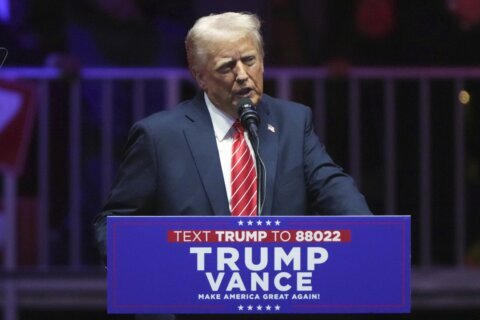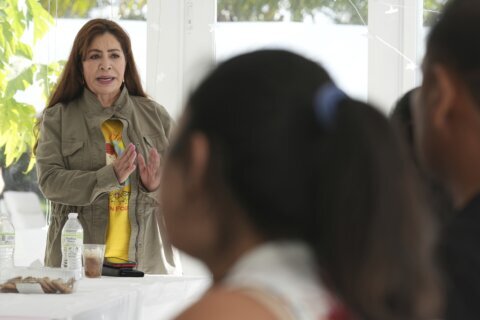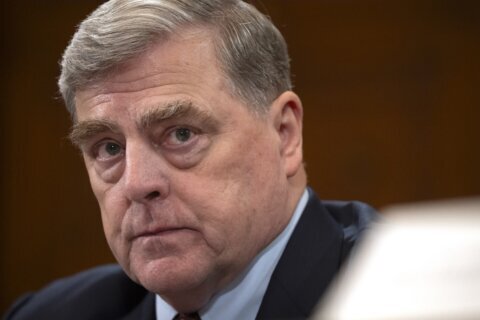PHILADELPHIA (AP) — Vice President Kamala Harris on Tuesday decried Republican Donald Trump for inflammatory rhetoric about migrants in Springfield, Ohio, and on other topics, saying voters should make sure he “can’t have that microphone again.”
Sitting down for a rare extended campaign interview Tuesday with a trio of journalists from the National Association of Black Journalists, Harris said her heart breaks after threats of violence have disrupted the city following comments amplified by Trump and his running mate alleging, without evidence, that immigrants are kidnapping and consuming people’s pets.
Two days after Secret Service agents foiled an apparent assassination attempt on Trump, who blamed Democratic rhetoric for the latest threat to his life, Harris said that “there are far too many people in our country right now who are not feeling safe.” She referenced the threats to immigrants, but also the conservative Project 2025 blueprint for the next Republican administration and a GOP-led effort to restrict abortion access.
“Not everybody has Secret Service,” she said. “Members of the LGBTQ community don’t feel safe right now, immigrants or people with an immigrant background don’t feel safe right now. Women don’t feel safe right now.”
Harris said she personally has confidence in the Secret Service and feels safe under their protection. She spoke briefly with Trump on Tuesday to express her gratitude that he was safe, but in the interview said his rhetoric should be disqualifying.
“When you have that kind of microphone in front of you, you really ought to understand at a deep level that your words have meaning,” Harris said, without mentioning Trump by name. “Let’s turn the page and chart a new way forward and say you can’t have that microphone again.”
Harris said the Republican attacks on the city and migrants there were “lies that are grounded in tropes that are age old.”
The sedate interview in Philadelphia stood in contrast to former President Donald Trump ’s appearance before the same organization just a month ago, which turned contentious over matters of race and other issues.
The Trump interview opened a chapter in the campaign in which the Republican candidate repeatedly questioned Harris’ racial identity, baselessly claiming that she had only belatedly “turned Black” at some point in her professional career. Trump has since repeatedly questioned Harris’ racial identity on the campaign trail and during the September presidential debate.
Harris, the daughter of a Jamaican father and an Indian mother, has repeatedly dismissed Trump’s remarks as “the same old show.” During her September debate with Trump, she said it was a “tragedy” that he had “attempted to use race to divide the American people.”
The vice president insisted she is working to earn the vote of Black men and not taking any constituency for granted. Black male voters are traditionally one of the most consistently Democratic-leaning demographics in the nation. But Republicans have tried to make inroads, while Democrats worry about flagging enthusiasm at the polls.
“I think it’s very important to not operate from the assumption that Black men are in anybody’s pocket,” Harris said. “Black men are like any other voting group. You gotta earn their vote, so I’m working to earn the vote, not assuming I’m gonna have it because I’m Black”
Harris declined to say if she supported reparations for descendants of slaves, but said, “we need to speak truth about the generational impact of our history in terms of the generational impact of slavery, the generational impact of red lining.” She said expressed openness to studying the question “to figure out exactly what we need to do,” but said her focus was on building economic opportunity.
In Trump’s interview with NABJ, he lambasted the moderators and drew boos and groans from the audience at times. The interview also sparked debate within the NABJ convention itself, which operates both as a networking and communal space for Black professionals in media as well as a newsmaking event.
As with Trump’s appearance, the audience was made up of NABJ members and college students, but the tenor was markedly different. Where Trump called the reporters interviewing him “rude,” “nasty” and denounced their questions as “horrible,” Harris referred to the reporters who pressed her as “esteemed journalists.”
The crowd was inaudible throughout the Tuesday interview with Harris. In July, Trump’s comments were often met with laughter, shock and confusion from the room, which largely consisted of student journalists and media professionals outside political news.
Trump, his running mate, Ohio Sen. JD Vance, and other Republicans have criticized Harris for largely avoiding media interviews or interacting on the record with reporters who cover her campaign events. She and her running mate, Minnesota Gov. Tim Walz, gave a joint interview to CNN last month. Her campaign recently said she would be doing more local media, and last week she sat for her first solo television interview since becoming the Democratic nominee, taking questions from a Philadelphia station.
Asked whether Americans are better off today than four years ago when she and President Joe Biden entered office, Harris did not directly answer the question, instead referencing the state of the economy during the COVID-19 pandemic and bringing up her plans to try to lower housing costs and promoting herself as a “new generation” of leader.
Harris said her candidacy offers the country a chance at “turning the page on an era that sadly has shown us attempts to by some to incite fear to create division in our country.”
Janiyah Thomas, Black media director for the Trump campaign, said Harris’ remarks to the National Association of Black Journalists on Tuesday reveal her record of failures for Black Americans.
“She told the NABJ that after three and half years of her failed policies, grocery prices are too high and the American Dream is unattainable for young Americans,” Thomas said. “We can’t afford four more years of Kamala Harris. It’s time to put President Trump back in the White House and restore economic prosperity.”
Harris has largely sidestepped traditional media appearances and instead focused on rallies, grassroots organizing and social media engagement, where the vice president can sidestep questions from independent journalists about her policy record and proposed agenda.
Tuesday’s event was moderated by Eugene Daniels of Politico, Gerren Keith Gaynor of theGrio and Tonya Mosley of WHYY, a Philadelphia-area public radio station that co-hosted the gathering.
Asked whether she would change U.S. policy toward the Israel-Hamas war, Harris said she endorsed Biden’s pause on 2000-lb. bombs to Israel and didn’t signal any daylight with the president.
Harris noted the killing of Israeli civilians — and some Americans – by Hamas on Oct. 7 and added that far too many “innocent Palestinians have been killed” in Israel’s response.
She added that the Israel-Hamas war has to end and a ceasefire and hostage deal must get done, while calling for a two-state solution to the Israel-Palestinian conflict. She said the goal is to ensure “the Israelis have security and Palestinians in equal measure have security, have self-determination and dignity.”
NABJ noted the importance of hosting the conversation in Philadelphia, a major city in a battleground state with a large Black population. Philadelphia was also the home to one of the major precursor organizations to NABJ.
For years, the association has invited both major presidential candidates to speak before the convention. Presidents George W. Bush, Barack Obama and Joe Biden all attended NABJ events as presidential candidates or while in office.
___
Brown reported from Washington. AP writers Zeke Miller and Colleen Long in Washington contributed.
Copyright © 2025 The Associated Press. All rights reserved. This material may not be published, broadcast, written or redistributed.









